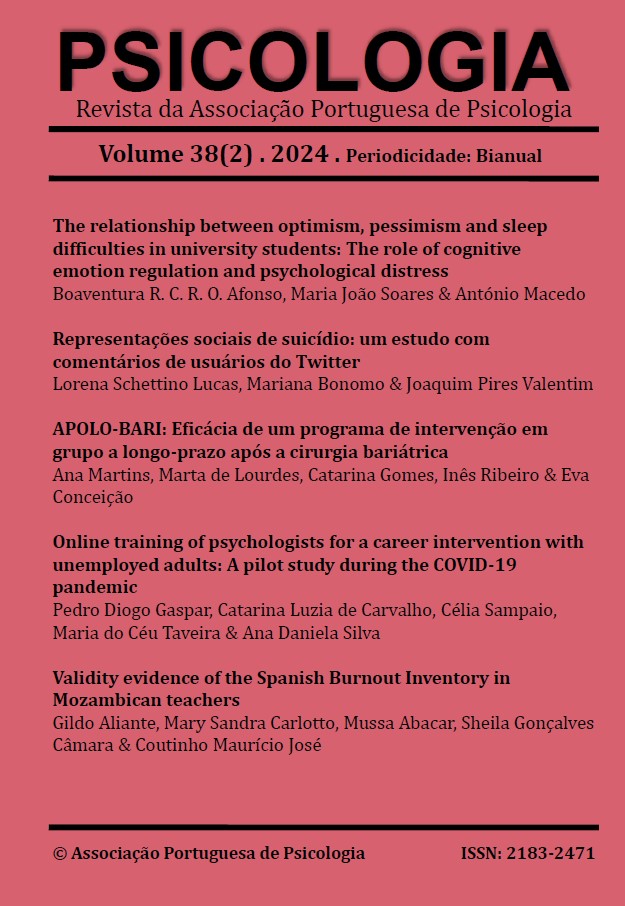Online training of psychologists for a career intervention with unemployed adults: A pilot study during the COVID-19 pandemic
DOI:
https://doi.org/10.17575/psicologia.1961Palavras-chave:
formação online, psicólogos, avaliação da formação, intervenção de carreira, empregabilidade, aconselhamentoResumo
In Portugal, career counsellors require significant training, especially in the career development field. Online training emerged as a solution during the pandemic, but the evidence of its effects is still uncertain. This pilot study aimed to evaluate the effects of an online training course focused on a career psychological intervention model for unemployed adults. Eight female psychologists (Mage = 30.75; SD = 4.9) from different regions of the country participated in the training. The study used a Diagnostic Evaluation Questionnaire, Evaluation Worksheets, and a Qualitative Evaluation Questionnaire to assess the effects of the training. Results showed an increase in the trainees' knowledge and performance after the course and trainees reported their satisfaction with the training. However, they expressed the need for more practical examples. The study suggests that specialized, empirically validated training in career intervention may have important implications in increasing the quality of career interventions with unemployed individuals.
Downloads
Referências
Afrouz, R., & Crisp, B. R. (2020). Online education in Social Work, effectiveness, benefits, and challenges: A scoping review. Australian Social Work, 74(1), 55–67. https://doi.org/10.1080/0312407x.2020.1808030
Barros, L. O., Ambiel, R. A. M., & Noronha, A. P. P. (2019). Indicadores de formação teórica e prática de orientadores profissionais e de carreira [Indicators of theoretical and practical training of vocational guidance practitioners]. Revista Brasileira de Orientação Profissional, 20(2), 107-118. https://doi.org/10.26707/1984-7270/2019v20n2p107
Behrendt, P., Heuer, K., & Göritz, A. S. (2021). The effect of career counselor behavior on reemployment. Journal of Career Development, 48(5), 584-598. http://dx.doi.org/10.1177/0894845319880616
Blustein, D. L., Ali, S. R., & Flores, L. Y. (2019). Vocational Psychology: Expanding the Vision and Enhancing the Impact. The Counseling Psychologist, 47(2), 166–221. https://doi.org/10.1177/0011000019861213
Davis, C., Greenaway, R., Moore, M., & Cooper, L. (2018). Online teaching in Social Work Education: Understanding the challenges. Australian Social Work, 72(1), 34–46. https://doi.org/10.1080/0312407x.2018.1524918
Degn, L., Franssen, T., Sorensen, M. P., & Rijcke, S. (2018). Research groups as communities of practice - A case study of high-performing research groups. Higher Education, 76(2), 231-246. https://doi.org/10.1007/s10734-017-0205-2
Edelson, D. C., & Joseph, D. M. (2004). The Interest-Driven Learning Design Framework: Motivating Learning through Usefulness. In Y. B. Kafai, W. A. Sandoval, N. Enyedy, A. S. Nixon & F. Herrera (Eds.), Embracing Diversity in the Learning Sciences: Proceedings of the Sixth International Conference of the Learning Sciences (pp. 166 - 173). Lawrence Erlbaum Associates.
Freeman, S., Eddy, S. L., Mcdonough, M., Smith, M. K., Okoroafor, N., Jordt, H., & Wenderoth, M. P. (2014). Active Learning Increases Students’ Performance in Science, Engineering, and Mathematics. Proceedings of the National Academy of Sciences of the United States of America, 111, 8410-8415. https://doi.org/10.1073/pnas.1319030111
Green, Z. A., Noor, U., & Hashemi, M. N. (2019). Furthering proactivity and career adaptability among university students: Test of intervention. Journal of Career Assessment, 28(3), 402-424. https://doi.org/10.1177/1069072719870739
Kirkpatrick, D. L., & Kirkpatrick, J. D. (2006). Evaluating training programs: The four levels (3rd ed.). San Francisco: Berrett - Koehler Publishers, Inc.
Kunche, A., Puli, R. K., Guniganti, S., & Puli, D. (2011). Analysis and Evaluation of Training Effectiveness. Human Resource Management Research, 1(1), pp. 1-7. http://article.sapub.org/10.5923.j.hrmr.20110101.01.html
Lazorak, O. V., Belkina, O. V., & Yaroslavova, E. N. (2021). Changes in Student Autonomy via E-Learning Courses. International Journal of Emerging Technologies in Learning (iJET), 16(17), pp. 209–225. https://doi.org/10.3991/ijet.v16i17.23863
Leon, A. C., Davis, L. L., & Kraemer, H. C. (2011). The role and interpretation of pilot studies in clinical research. Journal of Psychiatric Research, 45(5), 626-629. https://doi.org/10.1016/j.jpsychires.2010.10.008
Lu, H., & Dzikria, I. (2019). Critical Success Factors (CSFs) of Distance Learning Systems: A Literature Assessment. 2019 International Joint Conference On Information, Media And Engineering (IJCIME). https://doi.org/10.1109/ijcime49369.2019.00044
Mäkelä, T., Mehtälä, S., Clements, K., & Seppä, J. (2020). Schools Went Online Over One Weekend – Opportunities and Challenges for Online Education Related to the COVID-19 Crisis. In Proceedings of EdMedia + Innovate Learning (pp. 77-85). Online, The Netherlands: Association for the Advancement of Computing in Education (AACE). https://www.learntechlib.org/primary/p/217288/
Martins, L. B., Zerbini, T., & Medina, F. J. (2019). Impact of online training on behavioral transfer and job performance in a large organization. Journal of Work and Organizational Psychology, 35, 27-37. https://doi.org/10.5093/jwop2019a4
Mendes, S. A., Abreu-Lima, I., & Almeida, L. S. (2015). Psicólogos escolares em Portugal: Perfil e necessidades de formação [School psychologists in Portugal: Training profile and educational needs]. Estudos de Psicologia (Campinas), 32(3), 405-416. https://doi.org/10.1590/0103-166X2015000300006
Paudel, P. (2021). Online education: Benefits, challenges and strategies during and after COVID-19 in higher education. International Journal on Studies in Education (IJonSE), 3(2), 70-85. https://doi.org/10.46328/ijonse.32
Perez-Soltero, A., Aguilar-Bernal, C., Barcelo-Valenzuela, M., Sanchez-Schmitz, G., Meroño-Cerdan, A. L., & Fornes-Rivera, R. D. (2019). Knowledge Transfer in Training Processes: Towards an Integrative Evaluation Model. IUP Journal of Knowledge Management, 17(1).
Rae, L. (1999). Using evaluation in training and development. London: Kogan Page.
Savickas, M. L. (2019). Career Counseling (2nd ed.). American Psychological Association. https://doi.org/10.1037/0000105-000
Simonson, M. (2009). Distance learning: Education beyond buildings. Encyclopaedia Britannica 2009 Book of the Year, 231.
Simonson, M., Smaldino, S., & Zvacek, S. (2015). Teaching and Learning at a Distance (6th ed.). Charlotte, North Carolina: Information Age Publishing.
Sokolová, L., Papageorgi, I., Dutke, S., Stuchlíková, I., Williamson, M., & Bakker, H. (2022). Distance Teaching of Psychology in Europe: Challenges, Lessons Learned, and Practice Examples During the First Wave of COVID-19 Pandemic. Psychology Learning & Teaching, 21(1), 73–88. https://doi.org/10.1177/14757257211048423
Song, L., Singleton, E. S., Hill, J. R., & Koh, M. H. (2004). Improving online learning: Student perceptions of useful and challenging characteristics. Internet and Higher Education, 7(1), 59-70. Elsevier Ltd. https://doi.org/10.1016/j.iheduc.2003.11.003
Teymori, A., & Fardin, M. (2020). COVID-19 and Educational Challenges: A Review of the Benefits of Online Education. Annals of Military and Health Sciences Research, 18(3). https://doi.org/10.5812/amh.105778
Yarbrough, D. B., Shulha, L. M., Hopson, R. K., & Caruthers, F. A. (2011). The program evaluation standards: A guide for evaluators and evaluation users (3rd ed.). Thousand Oaks, CA: SAGE.


